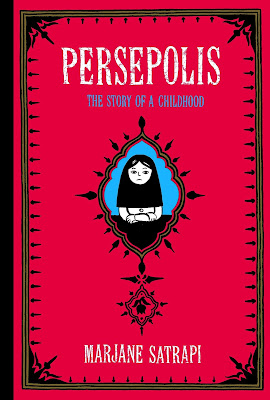"Persepolis" by Marjane Satrapi
Having read stories about the Holocaust in Maus and the Civil Rights Movement in March, I wasn’t sure I was ready to read yet another story about the war. Even yet, this book about a young girl dealing with the Islamic Revolution was so different and appealing to read. Maybe it was the fact that this time the protagonist was a female and we see her go through this at a young age that made me relate more to that female perspective. Maybe it was the same fact that it’s through the eyes of a younger child, which leads to more elements of humor that are improper yet justifiable from the words of a child. This could be the factor that encaptures a different take on life during the war and makes it special than other stories. Specially in the beginning with Marji’s interest in religion and how she even sees herself as being the next prophet. It’s sad yet realistic to see her come to the realization of what life has become and what’s at stake because of it.
Many people will not find her beliefs and actions to be right for a kid her age (finding it honorable how long her uncle stays in prison as a sign of heroism OR making a kid suffer through his father killing communists at his job) but the reason why I didn’t go that far into judging it was because I’m aware that this is all her people know. As someone who’s not from this country, who’s from a place filled with issues of communism and (as many of the older generations will say) dictatorship, it’s easier for me to understand how many kids can have a different mindset of what’s good and what’s fair based on their country and the culture they live in. That’s all she knows and, throughout the time the war begins when she moves to Switzerland, that’s when you finally see her transition into learning what life outside of Iran can be.
It’s not your typical slice of life kind of story. Nevertheless, I personally really enjoyed it and it must be the fact that I also had a strange childhood at the age of ten. The art style is simple yet beautiful and pays homage to German expressionism (You can tell her inspiration after she moved and transitioned in Europe). I don't know, I didn’t have a lot of big expectations at first, having read Maus and March before this one. And in the end, I ended up really liking this semi-historical story. It’s expositional like the previous readings but it’s easier and lighter enough to digest. I think I just really connected with her vulnerability and the impotence someone has at that age when it comes to wanting to help but not being able to. Some of her actions, like yelling at authority figures from time to time cannot be always justifiable but I appreciate where she’s coming from; her spirit and what she’s trying to fight for. Find a way for her voice to be heard and the ones of many other women.




Comments
Post a Comment